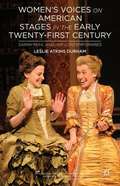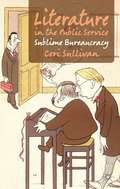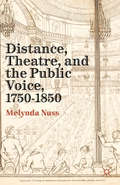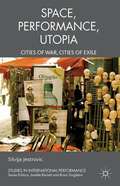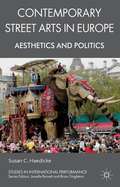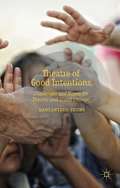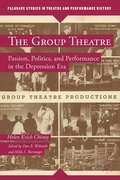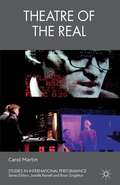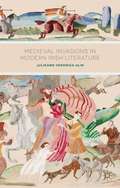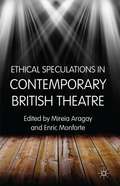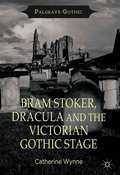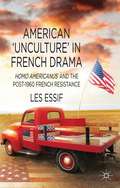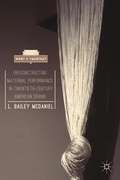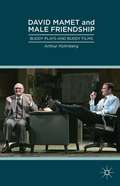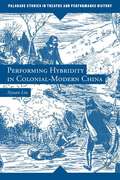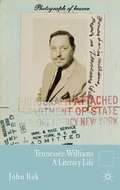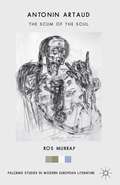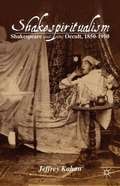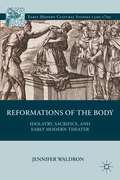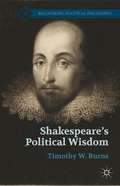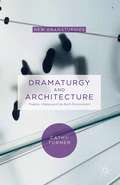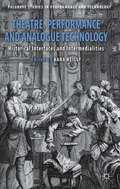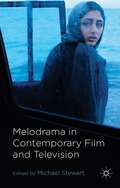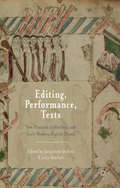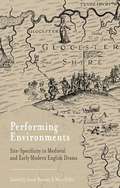- Table View
- List View
Women’s Voices on American Stages in the Early Twenty-First Century
by Leslie Atkins DurhamWomen have claimed a spot at the center of American theatre, and the characters they craft, the stories they tell, the questions they pose, and the ideas they materialize have the potential to shape the cultural imagination of a large group of theatre-goers as a complex new era unfolds. Sarah Ruhl is the early twenty-first century's most widely produced and frequently honored American female playwright. While critics have heretofore emphasized the whimsical elements of her dramaturgy, this study highlights her feminist engagement with current social and ethical concerns. Ruhl's popular, feminist plays are best appreciated when they are read in concert with the work of her contemporaries - Lisa Loomer, Diana Son, Joan Didion, Jenny Schwartz, Young Jean Lee, Kate Fodor, Yasmina Reza, Bathsheba Doran, Lynn Nottage, and Kia Corthron - whose writing also wrestles with the vexing issues facing Americans in the new century.
Literature in the Public Service
by Ceri SullivanHistorians and sociologists have been consistently - albeit gloomily - enthralled by Max Weber's model of the inevitable rise of the neurocrat. However, literary critics positively boast that writers, like academics, cannot 'do admin'. While Weber's thesis about the rise of the entrepreneur all fire, individuality, thrust is in tune with what we think literature is about, his thesis about the rise of the bureaucrat is not. Yet 'creative bureaucracy' is not only a euphemism for bending the rules. Literature in the Public Service shows how the public service makes its workers original, taking them beyond an individuated point of view to imagine the perfect public system. Creativity theorists too have swapped the model of solitary inspiration for a managed creative environment. John Milton, Anthony Trollope, and David Hare are examples of how authors work in and write about the public service, during its crisis moments. "
Distance, Theatre, and the Public Voice, 1750–1850
by M. NussAs theatres expanded in the eighteenth and nineteenth centuries, the distance between actor and audience became a telling metaphor for the distance emerging between writers and readers. Nuss explores the ways in which theatre helped authors imagine connecting with a new mass audience.
Performance, Space, Utopia
by Silvija JestrovicThe war in the Balkans that took place between 1991-1995 forms the context of this book. It has been variously viewed as ethnic strife, religious conflict, or civil war but seldom has it been described as a war against cities. Belgrade and Sarajevo offer a fascinating comparative case study, not only because the two cities belong to the same historical narrative of the breakdown of Yugoslavia, but because of the ways in which their various performances both complement and contradict one another. This book examines how performance and theatricality became modes of being and acting in the city, even strategies of physical and ethical survival; yet so often it is exile, both as marginalisation within and exodus from the city, that emerges as the defining consequence of living in Sarajevo or Belgrade in the 1990s.
Contemporary Street Arts in Europe
by Susan C. HaedickeStreet theatre invades a public space, shakes it up and disappears, but the memory of the disruption haunts the site for audiences who experience it. This book looks at how the dynamic interrelationship of performance, participant and place creates a politicized aesthetic of public space that enables the public to rehearse democratic practices.
Theatre of Good Intentions
by Dani Snyder-YoungTheatre of Good Intentions examines limitations of theatre in the creation of social and political change. This book looks at some of the reasons why achieving such goals is hard; examining what theatre can and can't do. It examines a range of applied and political theatre case studies, focusing on theatre's impact on participants and spectators.
The Group Theatre
by Helen Krich Chinoy Don B. Wilmeth Milly S. BarrangerThe Group Theatre , a groundbreaking ensemble collective, started the careers of many top American theatre artists of the twentieth century and founded what became known as Method Acting. This book is the definitive history, based on over thirty years of research and interviews by the foremost theatre scholar of the time period, Helen Chinoy.
Theatre of the Real
by Carol MartinAt an unparalleled time of the construction of reality across the fields of the science and humanities on a variety of platforms, theatre and performance participates in the current obsession with the problems and possibilities of the epistemologies of the real by using and revising the conventions of dramatic writing and performance to create and recreate personal, national, historical, and virtual realities. Theatre of the Real examines a wide range of international theatre and performance that claims a special relationship to contemporary reality in order to theorize how theatre and performance participates in how we come to know, experience, and understand the important events of our personal, social and political lives. The wide range of works discussed include Kamp and History of the World - Part Eleven by Hotel Modern, Is. Man by Adelheid Roosen, I am My Own Wife by Doug Wright, Southern Exposure by JoAnne Akalaitis, My Name is Rachel Corrie by Alan Rickman and Katherine Viner and Via Dolorosa by David Hare.
Medieval Invasions In Modern Irish Literature
by Julieann Veronica UlinMedieval Invasions in Modern Irish Literature offers the first book-length treatment of the literary return to and reinterpretation of Giraldus Cambrensis's twelfth century The History of the Conquest of Ireland. Writers studied include W. B. Yeats, Lady Gregory, James Joyce, Sean O'Faol#65533;in, Miche#65533;l Mac Liamm#65533;ir, Brendan Behan and Jamie O'Neill.
Ethical Speculations in Contemporary British Theatre
by Mireia Aragay Enric MonforteThis volume is the first to offer a comprehensive critical examination of the intersections between contemporary ethical thought and post-1989 British playwriting. Its coverage of a large number of plays and playwrights, international range of contributors and original argumentation make it a key point of reference for students and researchers.
Bram Stoker, Dracula and the Victorian Gothic Stage
by Catherine WynneBram Stoker worked in the theatre for most of his adult life, as theatre reviewer in Dublin in the 1870s and as business manager at London's Royal Lyceum Theatre in the final two decades of the 19th century. Despite this, critical attention to the influence of the stage on Stoker's writing has been sparse. Bram Stoker, Dracula and the Victorian Gothic Stage addresses this lacuna, examining how Stoker's fictions respond to and engage with Victorian theatre's melodramatic climate and, in particular, to supernatural plays, Gothic melodramas and Shakespearean productions that Henry Irving and Ellen Terry performed at the Lyceum. Bram Stoker, Dracula and the Victorian Gothic Stage locates the writer between stage and page. It reconsiders his literary relationships with key actors, and challenges the biographical assumption that Henry Irving provided the model for the figure of Count Dracula.
American ‘Unculture’ in French Drama
by Les EssifA book about the role America plays in the French imagination, as it translates to the French stage. Informed by a rich variety of Western cultural scholarship, Essif examines two dozen post-1960 works representing some of the most innovative dramaturgy of the last half century, including works by Gatti, Obaldia, Cixous, Koltes, and Vinaver.
(What is Theatre?)
by L. Bailey McDanielLooking at a century of American theatre, McDaniel investigates how race-based notions of maternal performance become sites of resistance to cultural and political hierarchies. This book considers how the construction of mothering as universally women's work obscures additional, equally constructed subdivisions based in race and class.
David Mamet and Male Friendship
by Arthur HolmbergUsing insights from psychology, sociology, anthropology, and the history of sexuality, Holmberg explores the ambiguity that drives male bonding. Personal interviews with Mamet and with the actors who have interpreted his major roles shed light on how and why men bond with each other and complement close analysis of Mamet's texts.
Performing Hybridity in Colonial-Modern China
by Siyuan LiuIn Shanghai in the early twentieth century, a hybrid theatrical form, wenmingxi, emerged that was based on Western spoken theatre, classical Chinese theatre, and a Japanese hybrid form known as shinpa. This book places it in the context of its hybridized literary and performance elements, giving it a definitive place in modern Chinese theatre.
Tennessee Williams
by John S. BakPerfect for students of English Literature, Theatre Studies and American Studies at college and university, The Theatre of Tennessee Williams provides a lucid and stimulating analysis of Willams' dramatic work by one of America's leading scholars. With the centennial of his birth celebrated amid a flurry of conferences devoted to his work in 2011, and his plays a central part of any literature and drama curriculum and uibiquitous in theatre repertoires, he remains a giant of twentieth century literature and drama. In Brenda Murphy's major study of his work she examines his life and career and provides an analysis of more than a score of his key plays, including in-depth studies of major works such as A Streetcar Named Desire, The Glass Menagerie, Cat on a Hot Tin Roof and others. She traces the artist figure who features in many of Williams' plays to broaden the discussion beyond the normal reference points. As with other volumes in Methuen Drama's Critical Companions series, this book features too essays by Bruce McConachie, John S. Bak, Felicia Hardison Londr#65533; and Annette Saddik, offering perspectives on different aspects of Williams' work that will assist students in their own critical thinking.
Antonin Artaud: The Scum Of The Soul (Palgrave Studies in Modern European Literature)
by Ros MurrayThis book serves as analysis of the aesthetics of materiality in the multifaceted work of Antonin Artaud, one of Twentieth-Century France's most provocative and influential figures, spanning literature, performance, art, cinema, media and critical theory.
Shakespiritualism
by Jeffrey KahanThis study concerns itself with a now-forgotten religious group, Spiritualists, and how their ensuing discussions of Shakespeare's meaning, his writing practices, his possible collaborations, and the supposed purity and/or corruption of his texts anticipated, accompanied, or silhouetted similar debates in Shakespeare Studies.
Reformations Of The Body
by Jennifer WaldronThis project takes the human body and the bodily senses as joints that articulate new kinds of connections between church and theatre and overturns a longstanding notion about theatrical phenomenology in this period.
Shakespeare’s Political Wisdom
by Timothy W. BurnsWinner of 2014 CHOICE Outstanding Academic Title Award, Shakespeare's Political Wisdom offers careful interpretations of five Shakespearean plays –Julius Caesar, Macbeth, The Merchant of Venice, King Lear, and The Tempest–with a view to the enduring guidance those plays can provide to human, political life. The plays have been chosen for their relentless attention to the questions that, for Shakespeare, form the heart and soul of politics: Who should rule, and what is justice? Burns provides an original reading of the plays through the lens of political philosophy rather than Theatre or Renaissance Studies. Shakespeare's wisdom found in these five plays, Burns concludes, provides a deeply relevant critique of our contemporary civic culture.
Dramaturgy and Architecture: Theatre, Utopia and the Built Environment (New Dramaturgies)
by Cathy TurnerDramaturgy and Architecture approaches modern and postmodern theatre's contribution to the way we think about the buildings and spaces we inhabit. It discusses in detail ways in which theatre and performance have critiqued and intervened in everyday spaces, modelled our dreams or fears and made proposals for the future.
Theatre, Performance And Analogue Technology
by Kara ReillyThis trans-historical collection explores analogue performance technologies from Ancient Greece to pre-Second World War. From ancient mechanical elephants to early modern automata, Enlightenment electrical experiments to Victorian spectral illusions, this volume offers an original examination of the precursors of contemporary digital performance.
Melodrama in Contemporary Film and Television
by Michael StewartMelodrama in Contemporary Film and Television debates the ways in which melodrama expresses and gives meaning to: trauma and pathos; memory and historical re-visioning; home and borders; gendered and queer relations; the family and psychic identities; the national and emerging public cultures; and morality and ethics.
Editing, Performance, Texts
by Jacqueline Jenkins Julie SandersThe essays in this volume challenge current 'givens' in medieval and early modern research around periodization and editorial practice. They showcase cutting-edge research practices and approaches in textual editing, and in manuscript and performance studies to produce new ways of reading and working for students and scholars.
Performing Environments
by Susan Bennett Mary PolitoThis ground-breaking collection explores the assumptions behind and practices for performance implicit in the manuscripts and playtexts of the medieval and early modern eras, focusing on work which engages with performance-oriented research.
